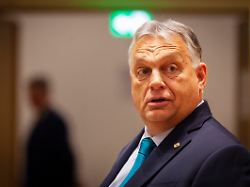Doubts about strategy
Orban is forcing the EU to have a fundamental debate on Ukraine
November 22, 2023, 3:21 p.m
In mid-December, the EU wants to make far-reaching decisions in favor of Kiev. Hungary’s Prime Minister Orban is now questioning the Union’s Ukraine strategy in a letter. Diplomats admit that the questions are right and important. With his veto threat, Orban could pursue a different goal.
Hungarian Prime Minister Viktor Orban wants to use a new veto threat to force a fundamental debate on the European Union’s Ukraine policy. As long as no consensus has been found on the future strategy for dealing with the country attacked by Russia, there can be no decisions at the level of heads of state and government about additional financial support, security guarantees or the EU enlargement process, writes Orban in a letter went to EU Council President Charles Michel and was also distributed to the EU partner countries in Brussels. An agreement on further Russia sanctions will not be possible until then.
Orban’s letter is causing a stir in Brussels because a large majority of EU states actually want to make far-reaching decisions in favor of Ukraine at a summit on December 14th and 15th. This includes the start of EU accession negotiations and further financial support amounting to billions until the end of 2027. However, a decision is only possible if none of the member states lodge a veto.
Specifically, Orban is calling for a number of questions to be addressed by the heads of state and government of the EU states. One is whether the EU strategic goal of a Ukrainian victory combined with fundamental political changes in Russia can still be seen as realistic. He also asks, for example, what type of security architecture is conceivable in Europe after the war and how Ukraine’s desire to join the EU can be reconciled with political and economic realities.
In Orban’s opinion, the basis for the debate should be a detailed analysis of the consequences of sanctions so far and the support programs for Ukraine. For example, the EU Commission has not yet communicated how the European economy will be affected by the punitive measures against Russia.
Does Orban want to extract billions for his country?
The most recent EU statement on Ukraine, adopted in October, is based on the assumption that the EU’s current strategy is working, Orban argues in the letter. However, the situation on the ground raises doubts about this, as the situation on the battlefield remains largely unchanged despite the Ukrainian counteroffensive. The developments warrant a “period of reflection” and possibly an adjustment of the EU’s goals and instruments, he writes.
Diplomats acknowledged that Orban asked correct and important questions in the letter. At the same time, however, his recent meeting with Kremlin leader Vladimir Putin further fueled suspicions that he was acting under Russian influence. In addition, it is likely that Orban is also interested in squeezing more than 13 billion euros in frozen EU funding for his country. The EU Commission announced around a year ago that it would only release the funds if Orban’s right-wing nationalist government fully implemented promises to uphold the rule of law. Orban believes that his country has met all the requirements.
The EU’s financial support for Ukraine is currently only guaranteed until the end of the year. A total of 18 billion euros was budgeted, and on Wednesday the EU transferred a further part of this amount of 1.5 billion euros. “This helps us to maintain economic stability under war conditions,” said Prime Minister Denys Schmyhal on Telegram. Brussels has supported Ukraine with 85 billion euros since the Russian invasion almost 21 months ago. EU Commission President Ursula von der Leyen had suggested that the EU candidate country should receive a further 50 billion euros by the end of 2027.
